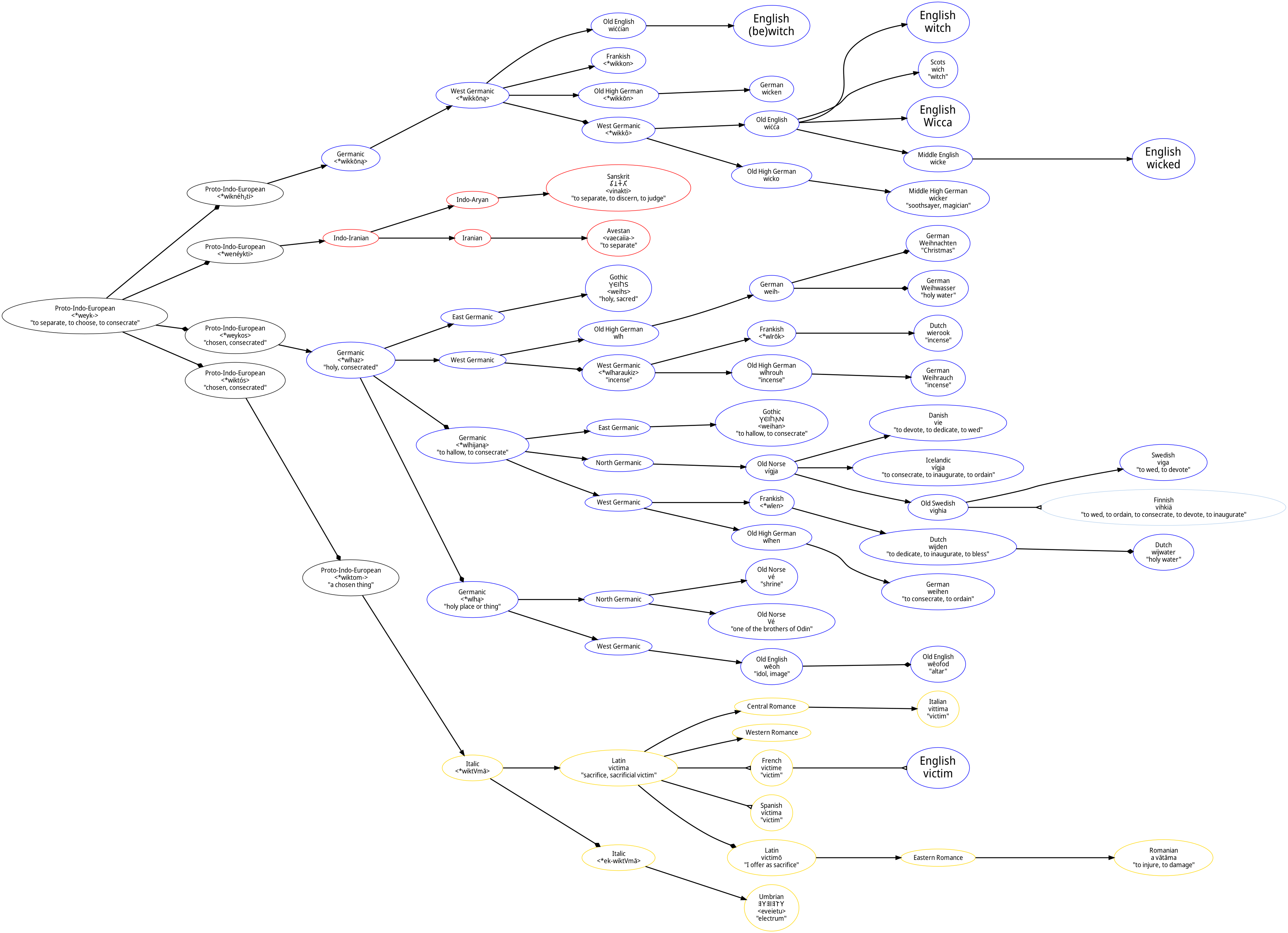Introduction
Bonus word family for Halloween by special request from my 4 year old: witch from *weyk-: "to separate, to choose, to consecrate".
*weyk- looks like an extended root implying *wey-, but I can't find any clear evidence for that root. If it is an extension of *wey-, a zero-grade of that would be the adverb *wi: "apart, asunder" (though that could also be a variant of *dwi-: "in two"). And/or *weyd-: "to see" could be another extension of *wey-; "see", "choose", and "pick out" reasonably forming a semantic group.
Teaser
wicked, bewitch, witch, victim
Full Text
-
Proto-Indo-European *weyk- to separate, to choose, to consecrate
-
Proto-Indo-European *wiknéh₂ti
-
Germanic *wikkōną to divine, to cast auguries
-
West Germanic *wikkōn to practice sorcery
-
Old English wiċċian to practice witchcraft
- Middle English wicchen to practice witchcraft, to bewitch
- English bewitch / witch
- Frankish *wikkon
-
Old High German *wikkōn
-
Middle High German wicken
- German wicken
-
-
Old Saxon *wikkōn
-
Middle Low German wicken
-
Low German wicken to divine, to practice sorcery
-
Low German Wicker wizard
- Low German Wickersche witch
-
-
-
-
West Germanic *wikkō sorcerer, wizard, witch
-
Old English wiċċa wizard, druid, necromancer
-
Middle English wicche witch, sorcerer, heretic, pagan
- English witch
- Scots wech / witch / wich witch
- English Wicca learned reborrowing
-
Middle English wikke / wicke evil, sinful, malicious adjectival use
- English wicked
- Scots wick wicked, naughty, a naughty child
-
-
Old High German wicko
- Middle High German wicker soothsayer, magician
-
-
-
-
-
Proto-Indo-European *wenéykti transitive imperfective
-
Indo-Iranian
-
Indo-Aryan
- Sanskrit 𑀯𑀺𑀦𑀓𑁆𑀢𑀺 vinakti to separate, to discern, to judge
-
Iranian
- Avestan vaēcaiia- to separate, to sort out
-
-
-
Proto-Indo-European *wéykos chosen, consecrated
-
Germanic *wīhaz holy, consecrated
-
East Germanic
- Gothic 𐍅𐌴𐌹𐌷𐍃 weihs holy, sacred
-
West Germanic
-
Old High German wīh
-
Middle High German wīch
-
Middle High German wīchenahten Christmas
- German Weihnachten Christmas
-
Middle High German wīchwazzer
- German Weihwasser holy water
-
-
-
West Germanic *wīharaukiz incense
-
Frankish *wīrōk
- Dutch wierook incense
-
Old High German wīhrouh incense
-
Middle High German wīhrouch
- German Weihrauch incense
-
-
-
-
Germanic *wīhijaną to hallow, to consecrate
-
East Germanic
- Gothic 𐍅𐌴𐌹𐌷𐌰𐌽 weihan to hallow, to consecrate
-
North Germanic
-
Old Norse vígja
-
Old East Norse
- Danish vie to devote, to dedicate, to wed
-
Old Swedish vighia
- Swedish viga to wed, to devote
- Finnish vihkiä to wed, to ordain, to consecrate, to devote, to inaugurate
-
Old West Norse
- Icelandic vígja to consecrate, to inaugurate, to ordain
-
-
-
West Germanic *wīhijan to hallow, to consecrate
-
Frankish *wīen
-
Dutch wijden to dedicate, to inaugurate, to bless
- Dutch wijwater holy water
-
-
Old High German wīhen
-
Middle High German wīhen
- German weihen to consecrate, to ordain
-
-
-
-
Germanic *wīhą holy place or thing
-
North Germanic *wīha
- Old Norse vé shrine
- Old Norse Vé one of the brothers of Odin [1]
-
West Germanic *wīh
-
Old English wēoh idol, image
- Old English wēofod altar
-
-
-
-
-
Proto-Indo-European *wiktós chosen, consecrated
-
Proto-Indo-European *wiktom a chosen thing
-
Italic *wiktVmā
-
Latin victima sacrifice, sacrificial victim
-
Central Romance
- Italian vittima victim
-
Middle French victime
- French victime victim
- English victim
- Spanish víctima victim
-
Latin victimāre to offer as sacrifice
-
Eastern Romance
- Romanian vătăma to injure, to damage
-
-
-
Italic *ek-wiktVmā
- Umbrian 𐌄𐌖𐌄𐌉𐌄𐌕𐌖 eveietu electrum lit. ~"it will consecrate"
-
-
-
-
Visual
Collected English words
witch, Wicca, wicked, bewitch, victim
Footnotes
-
^
In the Old Norse triad Óðinn, Vili, and Vé, originally all three alliterated, instead of just the two. They correspond to Common Germanic *Wōdinaz, *Wiljô, and *Wīhą or Proto-Norse *Wōdinaʀ, *Wiljo, and *Wīha. The /w/ in *Wōdin was absorbed by the rounded vowel.
*Wōdinaʀ, *Wiljo, and *Wiha represent three divine aspects of mind: ecstasy (transcendent inspiration), will (thought leading to action), and spiritual power, respectively.
